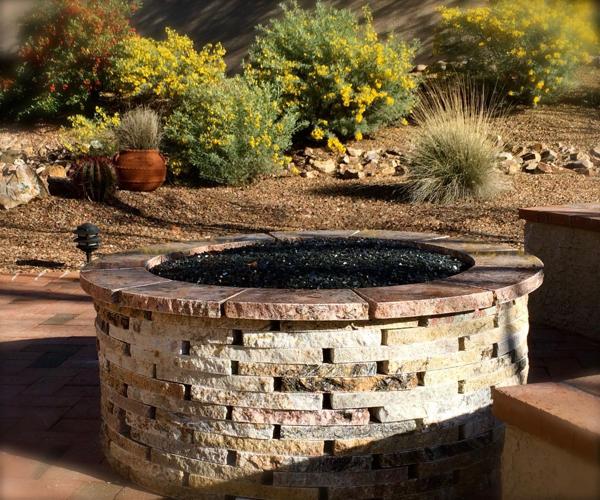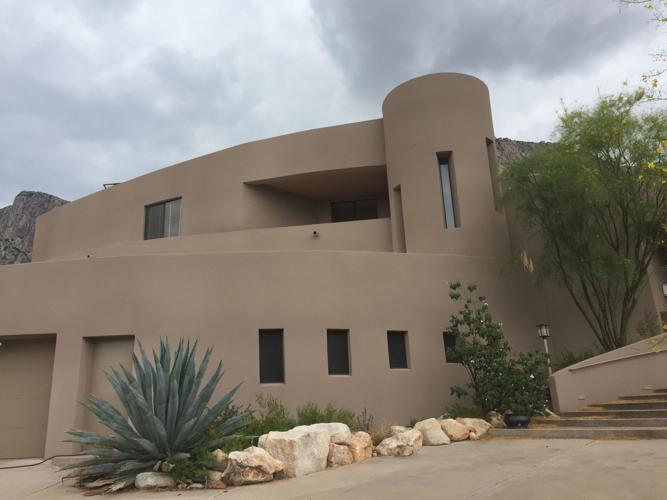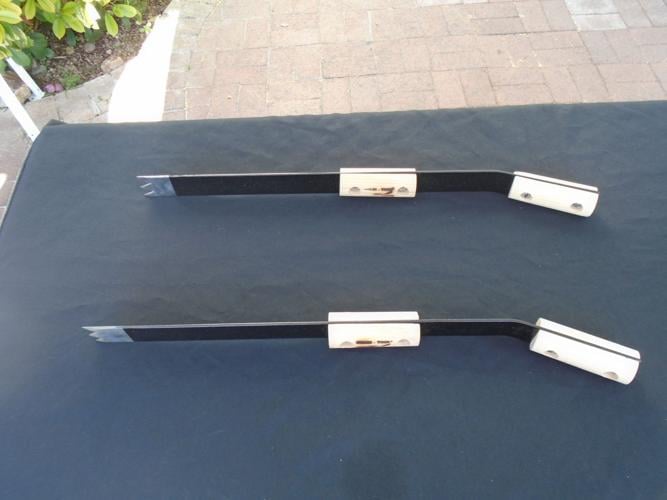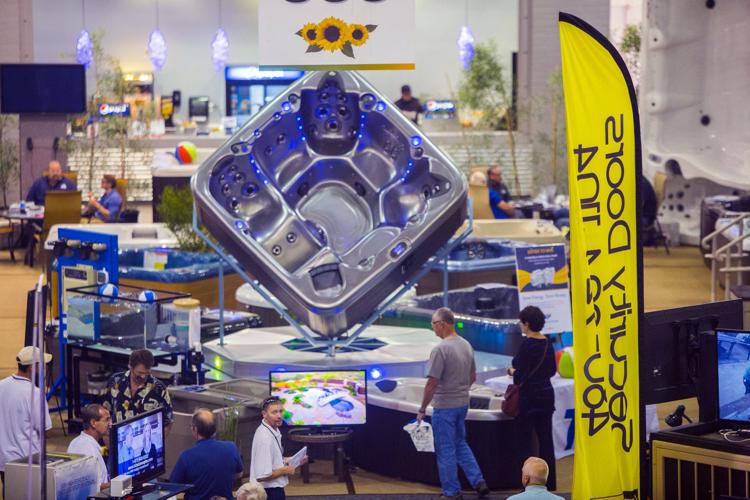Last month’s Home & Patio Show featured several outdoor products by local companies. In case you missed the event put on by the Southern Arizona Home Builders Association, here’s a rundown of a few of them.
GAS, PROPANE FIRE PITS
Tucson-grown A&E Recycled Granite LLC debuted its newest products at the show. They are natural gas and propane versions of the company’s popular fire pit kits.
Since its opening three years ago, the company owned by Josh and Julie Olauson has offered wood-burning fire pits that purchasers can assemble themselves. The pan is surrounded by a stack of granite cut from waste from countertops made by Arizona manufacturers.
“We had a lot of customers ask, ‘Can you do gas and propane?’” Julie Olauson says. “We’ve been working to offer gas and propane versions probably for a year.”
People are also reading…
They found that people were interested in the “ease of a gas fire pit,” she says, as well as in having a fire feature that would pass muster with homeowners associations that forbid burning wood.
The Olausons pride themselves as being a green company. They spent a bit of time trying to find an Arizona source for the pans and burners on the new versions. They were unsuccessful.
Finally, they located a manufacturer in Texas. A&E continues to create the stone surrounds in Tucson.
A buyer can assemble the fire pit from a kit or have someone like A&E or another contractor assemble it for additional cost. It can be ready for use by the day after delivery as long as the site is prepped and plumbing is complete.
Using gas or propane opens up design possibilities, Olauson says. They allow the fire pits to be higher and larger than wood-burning pits. Both dimensions are regulated to reduce fire danger.
The new products can be twice as expensive as wood-burning pits, which is why the company didn’t initially offer them.
“In the beginning we thought the market wasn’t going to be there to cover that cost,” says Olauson. “Now, since people know we’re here in Tucson and we have more clients and vendors, we can offer higher-end products.”
For more information, phone 885-8970 or visit the company website at www.aerecycledgranite.com
BOLDI-TOOL
Think of the Boldi-Tool as a hefty hand weeder. The flattened, bent metal rod is 24 inches long and weighs up to 2 pounds. It let’s you get into tough places and penetrate hard ground, says Matt Langlois, president and CEO of Boldi-Tool, a division of The Boldi Group Inc.
Gardeners can use the tool to get into rock- or gravel-covered ground or tight spaces to pop out weeds by the roots without greatly disturbing the ground cover, says Tucson resident Langlois.
The tool’s three-tined head goes through hard dirt down to 11 inches. The bend in the rod allows you to have enough leverage so that the Boldi-Tool can lift out not only weeds, but succulent and agave pups and bushes for replanting.
Langlois builds each tool, which was invented by his friend, Mike Boldi, and sells them for $20 at the farmers market at St. Philip’s Plaza.
“I’m not a professional gardener,” says Langlois. “(I) was just kind of doing normal maintenance at the house. I was combating the rocks and the gravel and getting frustrated.”
Boldi let Langlois try his invention to get at the weeds. “Once I used it, I could see the value of it,” adds Langlois.
Over some eight months of selling the Boldi-Tool, customers and other users have told Langlois of other ways they’ve used the product: creating holes for planting and digging trenches for irrigation systems.
“We still don’t know all the different uses for this tool,” says Langlois.
For more information, phone 289-5897. While the company has a website, bolditool.com, its e-commerce section is not working.
THERMAL CORKSHIELD
Homeowner Richard Highberger had some major problems with the elastic stucco exterior of his Oro Valley home.
“Water would seep through the top film layer and get behind it,” Highberger explains. “The sun would hit it and it would just bubble up.”
Ten years of patching and reapplying stucco didn’t help. What did work was a cork-infused spray.
The Thermal CorkShield is a spray of adhesive and ground cork. It’s been around in Europe – mainly Spain – for about 16 years, but made its debut in the United States nearly four years ago through the Tucson-based Vipeq Industries LLC.
Highberger had it applied to his home three years ago and is satisfied with the results. “We’ve had really good success with it,” he says.
The bubbling problem disappeared. The coating helps stabilize the interior temperature of the home day and night. It hasn’t faded like stucco.
Highberger, whose home has solar panels, also liked the coating’s sustainable properties. It’s made from a renewable resource, the bark of cork trees.
A Spanish chemist invented the coating after noticing that cork trees don’t burn easily, says Jerry Boettcher, business development manager of Vipeq Industries LLC.
Tucsonan Luis Maldonado got permission to market the product in countries other than in Europe – that’s left to Vipeq España – and now sells Thermal CorkShield through distributors and contractors under Vipeq USA and Vipeq Canada.
Boettcher ticks off the virtues of the product: “It won’t mold. It won’t rust. It’s hypo-allergenic and it won’t burn.”
He clarifies that last feature by saying the bonding agent isn’t fire resistant, but a fire retardant. That lower standard stems from the manufacturer using an adhesive that emits only low levels of harmful chemical vapors known as volatile organic compounds or VOCs.
The coating costs less than applying and painting stucco, says Boettcher, and comes in 80 standard colors. It can be applied to any surface.
For more information, phone 792-2675 or visit the company website, www.vipeqindustries.com


















